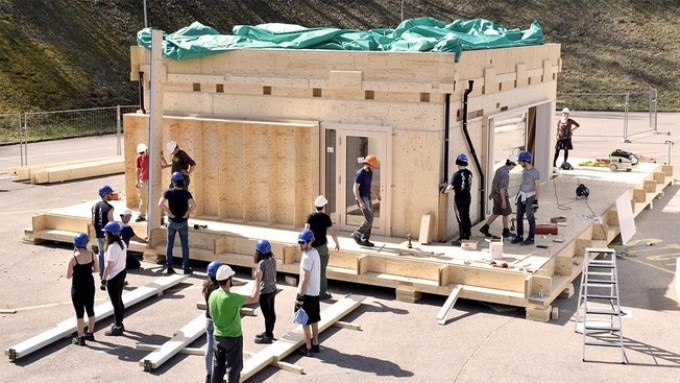Jun 5 2017
EPFL is taking part in the 2017 international Solar Decathlon competition by collaborating with the School of Engineering and Architecture of Fribourg, the Geneva School of Art and Design and the University of Fribourg.
A house called NeighborHub has been designed by Students. This house receives all its energy from solar panels installed only on the building’s façade and will be open to the public on June 10th 2017.
 The public will be able to discover the NeighborHUB, now finished, Saturday June 10th in Fribourg (C) Swiss Living Challenge / EPFL / 2017
The public will be able to discover the NeighborHUB, now finished, Saturday June 10th in Fribourg (C) Swiss Living Challenge / EPFL / 2017
Can a home run completely on solar facades? It seems it can according to NeighborHub, a house designed and constructed for the 2017 Solar Decathlon by Swiss students from EPFL, the School of Engineering and Architecture of Fribourg (HEIA-FR), the Geneva School of Art and Design (HEAD Genève) and the University of Fribourg (UNIFR). Using NeighborHub, the Students wanted to demonstrate that it makes both economic and practical sense to install solar panels on a home’s façade, thus maximizing the surface area put to use even though it can be difficult at times for sunlight to penetrate urban areas.
Unlike rooftops, facades are more likely to be in the shade since other buildings can block the sunlight. That could sharply reduce the amount of power that solar panels generate. But we wanted to show that solar energy can indeed be produced on facades, even in areas packed with a lot of buildings.
Philippe Couty, Engineer
The project team went ahead and searched for a technology capable of proving them right. Peter Cuony, Head of Solar Power Systems at Groupe E Connect and a member of the project team from the very beginning, suggested the concept of using power optimizers. The Students studied that these optimizers fit the bill perfectly well and they then installed one in each panel in order to regularly monitor and alter the performance of the solar panels.
Maximizing each panel’s output
In standard solar power systems, the panels are linked in series, meaning each one is capable of generating only as much energy as the lowest-producing one. The direct current is converted into the alternating current that the home can use by power inverters, taking their prompt from the least productive panel. However, this method can be a crucial handicap for the effectiveness of solar panels installed on building facades, as the weakest link, for instance, the most shaded panel, could pull down the whole system’s power generation. This indeed is what exactly took place before the installation of the power optimizers on each panel.
Even if each panel has a different level of sun exposure and consequently generates a different amount of energy, the optimizers draw on the instantaneous maximum power generation of each panel, regardless of how much sunlight they do – or don’t – receive.
Victor Saadé, EPFL Electrical Engineering Student
Achieving energy independence
With this novel way of using existing technology, NeighborHub is capable of running wholly on the power produced from its facade-installed solar panels. NeighborHub also produces more energy than it requires. In addition to this, its rooftop continues to be free for other purposes, such as promoting biodiversity –the space can be utilized for cultivating a wide range of plants.
Encouraging prospects for residential buildings are offered by the energy independence achieved by the one-story house. Each story is capable of producing an adequate amount of power for its own requirements. This indeed could be a vital benefit for cities that are growing vertically.“Our house demonstrates that it is possible to produce enough energy for an entire building using solar panels installed only on the building facades,” says Cuony.
NeighborHub’s open house, scheduled to open on June 10th 2017 will offer the public a unique opportunity to explore the next-generation house before it enters the Solar Decathlon competition, which will be held from 5th to 15th October 2017 in Denver.